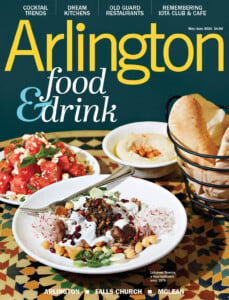Book Smart
What is the role of the 21st century library? Diane Kresh has all kinds of ideas.
Diane Kresh remembers the libraries of her youth as introverted cocoons, lined with individual study carrels and schoolmarms saying “Shhh.”
Times have changed. Today, Kresh views the library not only as a physical repository for books, but also as a social entity in an era when technology conspires to keep us apart. As the director of libraries for Arlington County, she is charged with figuring out new and innovative ways for the library to remain culturally relevant.
One approach, she says, is to become more embedded in people’s day-to-day lives. “I’d like to be able to put kiosks in the Metro, provide a book with Meals on Wheels and partner with Virginia Hospital Center to provide reading materials for patients. I don’t know how to do that, but to me that is the essence of being in the community.”
Kresh was raised in Arlington’s East Falls Church neighborhood and attended Stewart-Tuckahoe Elementary School (now Tuckahoe), Williamsburg Middle School and Yorktown High School. She went on to receive both an undergraduate and a master’s degree in library science from Catholic University (she also has a master’s in public administration from George Mason University), and lived in the District for 34 years while working at the Library of Congress. She moved back to Arlington in 2006 and today lives in Cherrydale with her sons, Nathaniel, 21, and Matthew, 25.
Now 59, Kresh is a fluent navigator of digital media. She sees techno-literacy as an important part of the library’s mission (it offers a host of free technology workshops, she points out), and she recognizes tablets and e-readers as the next generation of reading tools.
But when it comes to print, she admits to being a tactile person. “I like to flip through a magazine and look at a newspaper,” she says. “My preference is still to sit on my couch with a book and not move for several hours. I know you can do that with your Kindle, but there is something about the pages. I like the smell of books.”
As a child, did you enjoy reading?
Yes. I went to the Westover Branch and remember what a big deal it was when I went upstairs to the adult section for the first time.
What was your favorite children’s book?
Homer Price by Robert McCloskey. It’s a great story about a doughnut machine, a lost bracelet and small-town America from the perspective of a 10-year-old boy. When I was in my 20s, I found my very own copy of Homer Price and I’ve kept it ever since.
What’s your advice for parents whose child doesn’t like to read?
I’d explore what the child likes to do and see where there might be a link with books. When I was a kid, I loved to play baseball, and I liked to read about the history of baseball. Reading happens in all different ways. We have a hugely popular program called “Paws-to-Read” in which children read to a guide dog. It’s awesome because the guide dog isn’t going to say, “You missed that word there.”
Do you still have time to read?
I try to make time. I like serious fiction that tells a story, while at the same time changing your thinking, or allowing you to experience someone else’s perspective—books that answer big questions about life. Maybe it’s dealing with complex subjects, like illness, or death, or grief, or the loss of a child. There’s something transformational that happens. But not all fiction does that. I also read Gone Girl like everybody else.
Who are your favorite writers?
I like women writers like Ann Patchett, Ellen Gilchrist and Alice Munro. When Alice Munro won the Nobel Prize in Literature in October, we put out a display of her books, and within an hour of opening, they were all snapped up. My favorite book, currently, is The Magician’s Assistant by Ann Patchett.
Did you always want to be a librarian?
No. I wanted to be a lawyer. I fell into librarianship. When I was at Catholic University, I found a summer job at the Library of Congress. I started as a shelver and emerged, 33 years later, as director of some of the Library of Congress programs.
How did you become director of the Arlington Public Library?
I retired from the Library of Congress in January 2006. Within a month I was thinking of volunteering as a research librarian. I saw that Arlington had an opening for library director, so I went ahead and applied and got the job. It must have been kismet or something.
Are Arlingtonians avid library users?
More than 60 percent of Arlingtonians have library cards. That’s 10 percent higher than the national average. More than 1 million patrons visit the eight county libraries annually.
How would you describe Arlingtonians’ reading preferences?
They love challenging fiction; economics, history and politics; health and self-help; music, arts and travel; and The New York Times best sellers. Lately, The Lowland, by Jhumpa Lahiri, has a lot of hold requests. That’s an indication of its popularity. A few years ago, Freedom, by Jonathan Franzen, was very popular.
What’s with all the buzz about the library loaning American Girl dolls?
The American Girl lending program was something we started in March 2013. We had literally hundreds of little girls coming in and borrowing the dolls, just as you would a book or a DVD. The Center for Local History has created background sheets that describe Arlington in the period that each doll comes from. The Friends of the Library provided the funding for the dolls. This is an example of how we are making the library more about history and culture. Through the dolls, we can teach young people and their families about the history of Arlington.
Not everyone knows about the Center for Local History at the Central Library.
That’s the place where we have original, primary resource material about the county, both published and unpublished. You’ll find maps, oral histories, an extensive book collection on state history and old city directories. We’ve been digitizing a lot of old photographs in the collection. If you want to do a study of Metro, for example, you can go to the vertical file and see newspaper clippings, fliers and records of the county board hearings. We also have neighborhood conservation studies published by the county. Anybody doing serious research about Arlington should start here.
Some library activities occur outside of the library. For example, there’s a book club meeting at Westover Beer Garden. How did that come about?
A couple of years ago, we were doing a lot of soul-searching about whether or not we were meeting the needs of everybody in the community. We see a lot of children and seniors. Where is everybody else? Out of that came “Lit Up,” a program targeting 20-to-30-year-olds. The club has met several times at the beer garden, and about a dozen people have attended each time. You can sit and have beer and talk about the hot book. It’s a group of people getting together, a little geeky, but having fun.
What is the biggest challenge facing the Arlington library system today?
I think staying current. We are an increasingly urban population, and we are a population that is aging in place. How can I be assured I am meeting those needs? Continuing to find new and different ways to get feedback from the community is important, because not everybody is going to answer a survey, or come into the library, or send me an email. Rather than say we have a challenge, I’d say we have an opportunity to think differently about what we are doing and why.
How much does the library spend on books?
Our budget is $1.5 million annually for books and every day we are buying books. Every penny gets spent and still that is not enough.
The library recently received an $800,000 gift from a longtime Arlington resident, Rosemarie Bowie. Were you surprised?
Yes, we were surprised. That is an understatement. Personally, I was extraordinarily humbled by the selflessness of it. We have a lot of ideas about how we can use the gift in a way that will be respectful, and true to the intention of her generosity. So we are looking at something that would be a capital investment.
An avid reader and regular patron of the Westover Branch Library, Laura Fox is currently reading The House I Loved, by Tatiana de Rosnay.


